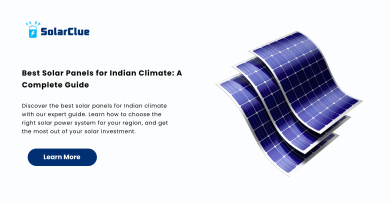Solar Panels Types: Your Comprehensive Guide
Solar energy has gained significant popularity in recent years as a clean and renewable source of power. With the rising demand for sustainable energy, countless innovations have been made in the solar industry, particularly in the development of solar panels. Solar panels consist of photovoltaic cells that convert sunlight into electricity. However, not all solar panels are created equal. In this blog, we will explore the various types of solar panels available on the market, shedding light on their unique features and benefits.
Table of Contents
Monocrystalline Solar Panels
Monocrystalline solar panels have long been considered the gold standard in the solar industry. These panels are crafted from a single, continuous crystal structure, typically made of pure silicon. The cells in monocrystalline panels have a consistent dark color due to their higher efficiency – around 15-20%. They are known for their sleek, uniform appearance, often being black or dark blue. The beauty of monocrystalline solar panels not only lies in their aesthetics but also in their efficiency, making them a favorite choice for homeowners and businesses alike.
Polycrystalline Solar Panels
Polycrystalline solar panels, on the other hand, consist of multiple silicon crystals melted together. This production process makes them more affordable compared to monocrystalline panels. Polycrystalline panels can be recognized by their bluish hue resulting from the uneven crystal structure. Although polycrystalline panels are slightly less efficient, typically around 13-16%, they still offer a reliable and budget-friendly option for those looking to harness the power of solar energy.
Thin-Film Solar Panels
Thin-film solar panels differ greatly from their crystalline counterparts in terms of appearance and manufacturing method. Rather than using solid silicon cells, thin-film panels are produced by depositing a thin layer of semiconductor material, such as amorphous silicon or cadmium telluride, onto a substrate. This thin-film technology makes them incredibly lightweight and flexible, allowing for diverse installation options. While thin-film panels are less efficient, with an average efficiency of 10-12%, their adaptability and reduced cost provide an attractive alternative for specific applications, such as large-scale solar farms.
Bifacial Solar Panels
Bifacial solar panels have gained traction in recent years due to their unique design. These panels capture sunlight not only from the front but also from the rear side, making use of reflected and diffused light. Bifacial panels are manufactured with a transparent backsheet, enabling them to absorb light from both directions. This innovative design results in a higher energy output, making bifacial panels a promising choice for areas with high albedo, such as snowy regions or buildings with reflective surfaces. With an efficiency ranging from 15-20%, bifacial panels are becoming increasingly popular in commercial installations.
Conclusion
Explore the variety of solar panels with SolarClue®’s comprehensive guide. We detail characteristics, advantages, and applications of monocrystalline, polycrystalline, thin-film, and other types. Elaborate on efficiency and performance differences, assisting consumers in choosing the most suitable option for their energy needs. Understand the durability and lifespan of different materials, ensuring long-term reliability. SolarClue® provides insights into the cost implications, helping balance upfront costs with long-term savings. Stay informed about technological advancements and dispel myths for confident decision-making. We guide on compatibility with mounting systems and offer considerations for upgrades. Stay ahead with SolarClue® as your trusted source for personalized consultations and recommendations based on your unique energy goals.
Frequently Asked Questions
SolarClue® offers a comprehensive guide on various solar panel types, explaining characteristics, advantages, and applications. We help consumers make informed decisions by providing detailed insights into monocrystalline, polycrystalline, thin-film, and other types of solar panels.
SolarClue® elaborates on the efficiency and performance differences among solar panels, including monocrystalline, polycrystalline, and thin-film types. We assist consumers in choosing the most suitable option based on energy needs and available space.
SolarClue® guides consumers in understanding the durability and lifespan of solar panel materials. We ensure they select panels offering long-term reliability and cost-effectiveness for their solar installations, considering factors such as weather resistance and material quality.
SolarClue® provides insights into the cost implications of different solar panel types. Our platform assists consumers in balancing upfront costs with long-term savings, ensuring financially sound decisions aligned with their budget and energy goals.
SolarClue® keeps consumers informed about technological advancements in solar panel types. We help them stay at the forefront of the industry, making choices based on the latest features and innovations for optimal efficiency and performance.
SolarClue® addresses common myths or misconceptions about solar panel types. We provide accurate information, helping consumers make decisions free from doubts and uncertainties and ensuring they have a clear understanding of the strengths and limitations of each type.
SolarClue® guides consumers on the compatibility of solar panel types with various mounting systems. We ensure they choose panels that seamlessly integrate with rooftop or ground-mounted installations, offering practical insights for efficient system integration.
SolarClue® recommends considerations for consumers looking to upgrade or expand solar panel installations. We assist them in choosing compatible panels that enhance overall system performance, considering factors such as compatibility, efficiency, and technology.
SolarClue® stays updated on market trends and emerging technologies in solar panel types. We ensure consumers have access to the latest information, empowering them with insights for informed decision-making and keeping them abreast of industry advancements.
SolarClue® assists consumers in comparing and contrasting solar panel types. We offer personalized consultations and recommendations based on their unique energy needs and preferences, ensuring a tailored approach to help them make the best-informed decisions for their solar installations.




